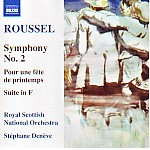Has anyone ever noticed that William Walton lifted the climaxes of the first movement of his Partita for Orchestra bodily from the Prélude of Roussel’s Suite in F? Granted, they aren’t the two best-known pieces in the world, but the comparison really is striking. Like so much of Roussel’s music, this marvelous work’s neglect is a total mystery: it’s an unalloyed delight that, at a scant quarter-hour, would make a perfect concert opener placed before a big concerto. The tone poem Pour une fête de printemps, title notwithstanding, is darker, very much in the same style as the exactly contemporaneous Second Symphony, though it brightens up toward the end.
This brings us to the symphony, one of the shattering masterpieces of the 20th century literature and certainly the finest piece to come out of D’Indy’s Schola Cantorum group of composers. There’s no way it will ever be as popular as it deserves to be. Its gloomy opening, with its shadowy string textures, foreshadows late Shostakovich, and despite having some instantly memorable tunes and one of the most glorious scherzos in the entire universe for a central movement, the work commits the ultimate sin of ending quietly. Given its emotional and technical complexity, that’s the kiss of death as far as programming is concerned.
Hot on the heels of Eschenbach’s recent, excellent version, Stéphane Denève adds further laurels to his splendid Roussel cycle with this equally fine performance. While adopting very similar tempos throughout, he manages an interpretation that’s quite different in character from Eschenbach’s: lighter in texture (partly a function of the RSNO’s bright basic timbre), and above all sharper in rhythm. You can hear this at the very outset, in the way Denève keeps up the Morse code-like motive (initially in the bassoons) right through the introduction. No one quite matches Martinon in the central scherzo, but this version comes very, very close, and in particular Denève, like Eschenbach, doesn’t fall into the trap of playing the movement too quickly. And as always the RNSO horn section, so critical in the first and last movements, sounds glorious. Naxos’ engineering is the most natural of all in terms of balance and perspective. Crank it up and wallow in some of the most marvelous symphonic music yet composed in France. [4/29/2008]
































